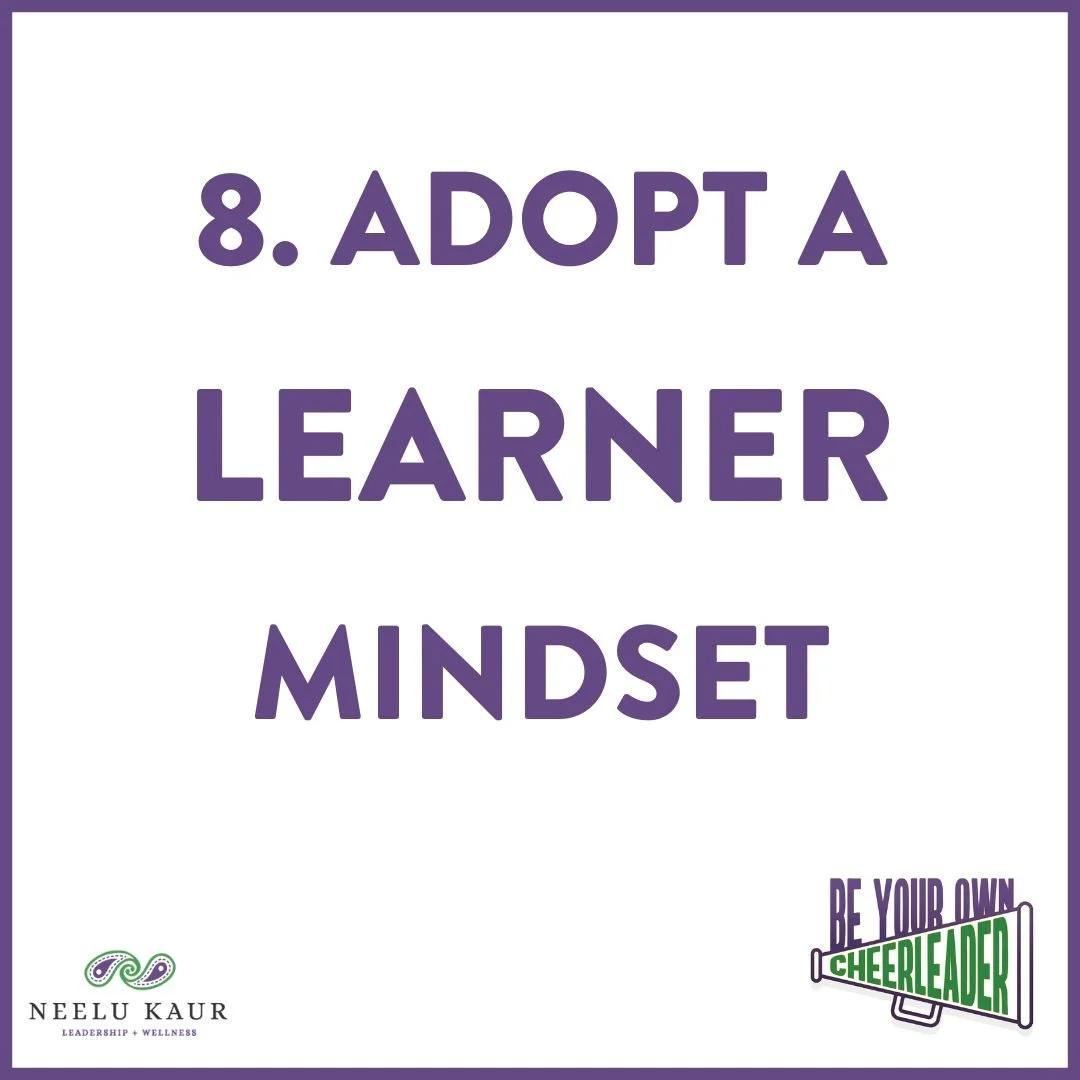10 Tips To Be Your Own Cheerleader
1. Thrive in both the "we" and the "I"
Is there an I in team? Yes!
Teamwork isn’t just about selflessly serving your team. It is a dance between the WE and the I in which we contribute to the team effort while also getting credit for what we ourselves brought to the table.
Those of us raised in collective cultures excel at the WE, working with the team to achieve a common goal. We don't always feel as comfortable claiming our ideas and seeking praise for them. You may feel magnanimous, but repeatedly missing out on the kudos you deserve will eventually convince you you've got less to offer than anyone else.
With the right tools you can learn to thrive in both the WE and the I.
2. Know what motivates you
Are you motivated by yourself or by other people?
Internally motivated people gather information from others and use their own internal standards to judge their performance and spur themselves on.
Externally motivated people wait for others to tell them whether they have done a good job or not. If you were raised in a collective culture you may find you lean more towards the external motivation pattern.
Neither is right or wrong and you can flow in and out of motivation styles; the key is learning to recognise what is motivating your responses in any given situation.
3. Pat yourself on the back
On the day of my graduation, my dad said to my mom (roughly translated), “How did she pull this off?”
He didn’t say “Well done!” or tell me how proud he was, nor did I expect him to.
What my dad did was help me to pay off my enormous debt. In collective Asian and South Asian cultures, verbal affirmations are culturally unfamiliar. Pride and love are more often expressed in actions than words.
There's nothing wrong with that. It's a difference not a deficit.
However, if you were raised without verbal affirmations — particularly if you are now surrounded by people who freely give and receive compliments — you might find them embarrassing or uncomfortable.
One way to exercise your compliment receiving muscles is to give yourself compliments whenever you can. Tell yourself you did great on that project, you rocked that difficult presentation, you even totally slayed making that coffee. It feels strange to begin with, but over time you will begin to internalize the good feelings and handle it better when others throw positive affirmations your way.
4. Thank your inner critic.
There’s a basic presupposition in NLP that every behavior is motivated by a positive intention or purpose. What might be the positive intent of your inner critic?
That negative voice actually comes from a place of concern, just like the voice of a critical parent. Your inner critic is worried because it cares about you. It wants to keep you safe, fed, and sheltered so it tries to avoid risks by saying you will probably fail.
Your inner critic is your nervous, overdramatic, catastrophizing little buddy.
It’s your Scooby Doo.
Instead of trying to silence it, remind yourself it is trying to help. Give it a reassuring hug, thank it for its concern, then politely ask it to stop harshing your vibe.
5. Be a bias interruptor
My success was once openly written off in the workplace as me "coming from a wealthy background and going to an Ivy League school,” which couldn’t be further from the truth.
With some body types, skin colors, voices come biases. Biases are mental shortcuts; ways to understand people based on other, similar looking people we have met or heard about. These biases can lead to the inaccurate and overly negative judgements we experience in our daily lives.
When left unaddressed, the scenarios pile up and lead to a downward spiral of low self-efficacy. This may leave you feeling less capable of being your own cheerleader.
You cannot eliminate all bias, but you can interrupt its impact by shining a spotlight on it when it happens:
Take a few deep breaths and check in with yourself to test whether you can respond rationally in the moment.
Remind yourself these biases operate unconsciously. It is unlikely the person meant to offend you personally. Gently say to yourself, "This has nothing to do with me."
With a calm state of mind, confront the person. For example, you could calmly repeat back to them what they just said... "So what you are saying is Indian women achieve success by paying their way into Ivy League schools?"
6. Engage your interruption shield
A study from George Washington University in 2017 found men interrupted women 33 percent more often than they interrupted other men. Over the course of a three-minute conversation, men interrupted women 2.1 times. In contrast, they interrupted other men only 1.8 times. Women on average interrupted men only once.
This problem is worse for women from collective cultures where there’s a strong sense that the hierarchy should not be questioned. We often accept interruption. We also struggle to jump back in and finish our point because no one ever modeled this for us. The conversation flows away, leaving us feeling silenced and wondering what we did wrong.
It's time to power up your interruption shield; a short phrase that deflects an interjection and puts the focus back on you...
"Hold on real quick, I'd just like to finish my point"
"If I may just complete that thought"
"Hold on, I need to jump in here"
Remember those interruption stats and practice raising your shields!
7. Go from constraint to expansion
Just 1 in 285 Asian and South Asian women who work in Fortune 500 tech companies are senior executives.
As Asian and South Asian women we constantly battle the idea that we are too timid to be executive material. And without role models, it's hard to be what we cannot see.
Power poses actively change the perception others have of us. In fact, they change the way we see ourselves. Research shows that when you adopt the Wonder Woman pose, testosterone goes up and cortisol goes down. All you have to do is stand tall with your hands on your hips. Practice making yourself look big and strong, and notice how your confidence increases. Try it!
8. Adopt a learner mindset
When you inner voice is judgmental, it locks you in a prison of negativity.
“Why am I such a failure?”
“Why can't I get a raise?”
With these questions you accept you are a failure who can’t get a raise. This judgmental mindset impedes your progress by limiting your horizons.
Get curious and adopt a learner mindset instead.
"What would winning look like?"
"What steps could I take to achieve my goals?"
"What should I say to convince my boss I deserve a raise?"
Observe your inner monologue for while. Are your questions judgey or curious?
9. Talk nice to yourself
If you lived or worked with someone who constantly commented on your imperfections and berated you for small mistakes, you’d soon start to feel bullied.
For some of us, that bully is our own inner voice. Are you kind or mean to yourself?
Here are 3 quick tips for noticing and improving your inner monologue:
When your thoughts wallow in in past regrets or future worries, bring them back to the present. Challenge their negativity and ask if you would let anyone else say these disparaging things to you.
Give yourself the same respect you would give another person. Don't instantly dismiss your own ideas or call yourself names. Listen and let your inner voice speak.
Compliment yourself at every opportunity for everything you do. It takes five positive comments to neutralize one negative comment so don't be afraid to go over the top.
10. Recognize your inner cheerleader
Have you spent much of your life longing for a friend or partner who will be there for you, supporting and cheering you on in everything you do?
Did you know that person is already in your life?
They are with you every moment of every day, every step of the way. They have the power to pick you up when you fall and protect you from adversity. They can soothe you in grief and loss. They can cheer you up and advocate for you.
Sometimes we don't recognize them for who they really are because they repeat cruel things people said to us when we were children or try to protect us by holding us back from success. But still they are there, waiting to show you how brilliant you really are.
That person is you.










